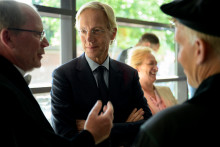Dijkgraaf knows that some parties, PvdA and GroenLinks for example, are now hesitant about supporting his bill, which will once again allow the drawing of lots to gain access to popular study programmes. ‘I share those doubts’, the minister tells the House of Representatives in the letter.
Since 2017, study programmes with a limited number of places (numerus fixus) have always had to select their new students individually on the basis of talent and motivation. That doesn’t always work well, say critics: selection is detrimental to particular groups of young people.
Selecting the best
Consequently, the government wants to allow those study programmes to use a lottery system once again. Dijkgraaf’s bill also provides that study programmes may select the best students first and then draw lots for the rest.
But a majority of the House of Representatives was not happy with it and added yet another option: the so-called Klaas Visser model. Study programmes are to be allowed to select the best candidates and reject the worst, and then draw lots for those in between.
Dijkgraaf has objections against rejecting the worst candidates, both fundamental (is the final exam not enough?) and practical (making a distinction is not so simple). The amendment was adopted nevertheless.
‘The secondary school diploma will now lose some of its importance’, Dijkgraaf writes to the House of Representatives. ‘If institutions make widespread use of it, the overall accessibility of higher education in the Netherlands may be affected.’
Misunderstood
Psychologist Klaas Visser himself has told newspaper NRC that the House of Representatives has misunderstood his model. He feels that you ought to be able to expect prospective students to make some effort, such as attending an information day or a matching interview. If they do not, they should not be included in the lottery, in his view. That is different from rejecting candidates on the basis of their talents.
Dijkgraaf has taken another close look at the amendment. What exactly does it say? It does not mention the basis on which candidates can be rejected. Additionally, the House of Representatives has insisted that study programmes have to substantiate the effectiveness of their selection procedure and how equal opportunity is safeguarded. ‘So I want to look at the amendment from that perspective.’
Furthermore, the universities and academic teaching hospitals have told the minister that they will interpret the amendment in the way that Klaas Visser has explained it. Dijkgraaf says he is OK with that.
Equal opportunity
So he remains committed to his bill. He considers that it is still an improvement on the current situation, given that a lottery system in any form is prohibited at the moment. The bill will enhance equal opportunity, in his opinion.
But he expresses a reservation. ‘If the House adopts the bill, I want to hold discussions – while the bill is being considered by the Upper House – on how exactly education institutions plan to deal with the leeway offered by the law.’
If necessary, he will clarify this point ‘through additional legislation’. ‘I am asking the institutions to take responsibility on this issue and will be monitoring this’, says Dijkgraaf.
Support
The House of Representatives votes on the bill this afternoon. It is already clear that the four coalition parties will support the bill. Three of them (VVD, CDA and ChristenUnie) are in favour of the amendment and the fourth (D66) considers the bill a step in the right direction, despite having doubts about the amendment.
It is worth noting that numerus fixus programmes must always use at least two criteria when making a selection. So they are not permitted to base their decisions only on the candidates’ grades, but have to take something else into account. A motivational interview or extra exam, for instance. The same applies to a ‘weighted’ lottery, in which certain candidates have a better chance than others.







